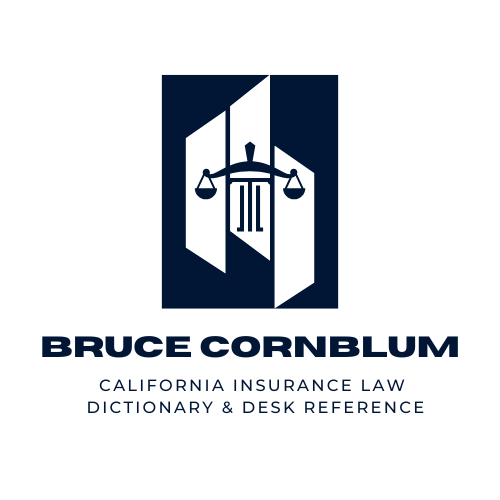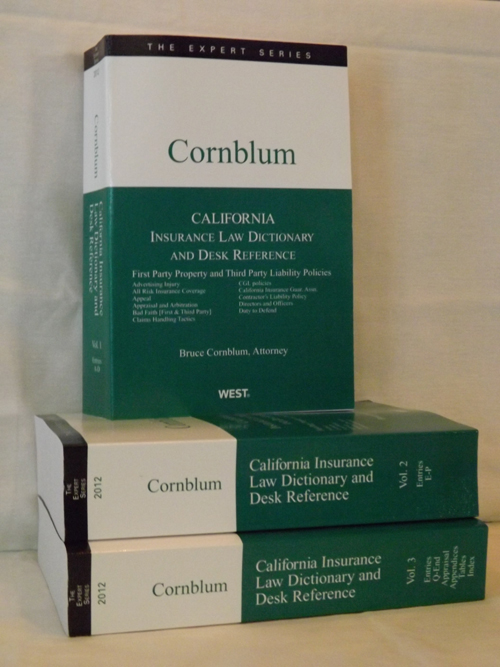This newsletter will explain the inadequacy of CACI 2330 as it relates to “Bad Faith” in an insurance case.
CACI 2330, Implied obligation of good faith and fair dealing explained
CACI 2330 states:
In every insurance policy there is an implied obligation of good faith and fair dealing that neither the insurance company nor the insured will do anything to injure the right of the other party to receive the benefits of the agreement.
To fulfill its implied obligation of good faith and fair dealing, an insurance company must give at least as much consideration to the interests of the insured as it gives to its own interests.
To breach the implied obligation of good faith and fair dealing, an insurance company must, unreasonably or without proper cause, act or fail to act in a manner that deprives the insured of the benefits of the policy. It is not a mere failure to exercise reasonable care. However, it is not necessary for the insurer to intend to deprive the insured of the benefits of the policy.
Paragraph (3) is confusing. The paragraph states: “To breach an implied obligation of good faith and fair dealing, an insurance company must unreasonably or without proper cause, act or fail to act in a manner that deprives the insured of benefits of the policy.” The very next sentence states: “It is not a mere failure to exercise reasonable care.” Thus failure to exercise reasonable care is not, without further explanation, unreasonable. This patent confusion can be cured by adding to the instruction a definition of “unreasonable”.
“Unreasonable” defined
“Unreasonable” in concept is a self-conscious disconnect (a large, unabridged gap) between, on the one hand, what the insurer is communicating to, demanding of, and paying its insured and, on the other hand, what the insurer actually thought it owed and would owe under the claim. [Bernstein v. Travelers (N.D. Cal., 2006) 447 F.Supp.2d 1100, 1108] See § B2 BAD FAITH LAWSUIT – FIRST PARTY[§ B2:6.2].
An insurer’s conduct is “unreasonable” when a refusal to discharge a contractual responsibility is prompted by a conscious and deliberate act which unfairly frustrates the agreed common purpose and disappoints the reasonable expectation of the other party thereby depriving the party of the benefits of the agreement. [Chateau Chamberay Homeowners v. Associated Inter. Ins. (2001) 90 Cal.App.4th 335, 346] See § U24 UNREASONABLE [§ U24:5]. Evidentiary proof of bad faith can be establish by cross examination of the adjuster and/or claims supervisor in first party claims. See § U24 UNREASONABLE [§ U24:5.2 Evidentiary proof of bad faith by cross examination of adjuster, etc.]. The standard of reasonableness may require an insurer to conduct an independent investigation. [§ U24:7.3]. Biased investigation techniques are illustrated at § U24:11. See § J13.03:4.13, (discussing CACI 2322). Good faith implies honesty, fair dealing and full revelation. Bad faith implies dishonesty, fraud and concealment. In each instance, the insurer is required to give serious and careful consideration to the true position and interest of its insured. See § U24: UNREASONABLE [§ U24:13 Third party liability policy – Factors: to protect insured from excess policy limits judgment]. The multiple grounds of unreasonable conduct by an insurer can be established in third party actions by cross examination of the insurance company’s representative regarding relevant standards, special rules, that he or she knew, having said persons admit to the existence of such claims adjusting standards. Such admissions would significantly assist the jury’s understanding of the framework within which the claim is made and must be handled. See § U24 UNREASONABLE [§ U24:15 Third party liability policy – Proving bad faith, etc.].
Proper cause
“Proper cause” is not defined for the jury in CACI 2330. ‘Proper cause’ is defined in the text at § P106.02 PROPER CAUSE. “Proper cause” exists to deny an insured’s claim when the insurance company relies upon existing Court of Appeal or Supreme Court opinions. [Bosetti v. U.S. Life Ins. Co. in City of New York (2009) 175 Cal.App.4th 1208, 1239]
“Proper cause” includes the consideration of the insured’s duties described in the policy to (1) give the insurer timely notice of the loss, (2) cooperate with regards to the insurer’s investigation, (3) providing a proof of loss in a first party claim. See § P106.02 PROPER CAUSE [§ P106.02:5 Duties of insured [first party loss]; “proper cause” to deny benefits]. In a third party claim where the insured is requesting a defense and/or indemnity, an insured has a duty to cooperate with the insurer. And the duty includes a requirement to disclose all pertinent facts, assist in giving evidence. The liability policy’s claims provisions must be complied with. See § P106.02:6 Duties of insured]. The jury should be further instructed as to the meaning of “proper cause” if there exist a factual issue regarding the insurer acting with proper cause, or if the insured is contending that the insurance company was not “prejudiced” [CACI 2320] [CACI 2321] discussed in § J 13.03:4.8 and § J13.03:4.9. If no facts exist proving a failure of the insured to give notice or a failure to cooperate, the court should not include the phrase “proper cause” in the instruction. If the insurer’s alleged reliance is based upon existing case law but the evidence proves that such reliance never existed or occurred, the insured should be able to have the jury so instructed thereby permitting the jury to find that “proper cause” did not exist to deny coverage. See Lance Cooper v. Republic Indem. (2001) 90 Cal.App.4th 1151, 1159-1160, discussed at § J13.03:4.16.
BOLDS references are to sections in Volumes 1, 2 and 3 of CALIFORNIA INSURANCE LAW DICTIONARY AND DESK REFERENCE, available through Thomson Reuters at 1-800-344-5008.
Subscribers to WestLaw can research all volumes of California Insurance Law Dictionary and Desk Reference on WestLaw by referencing CAINLAWDDR

